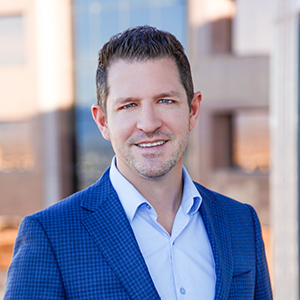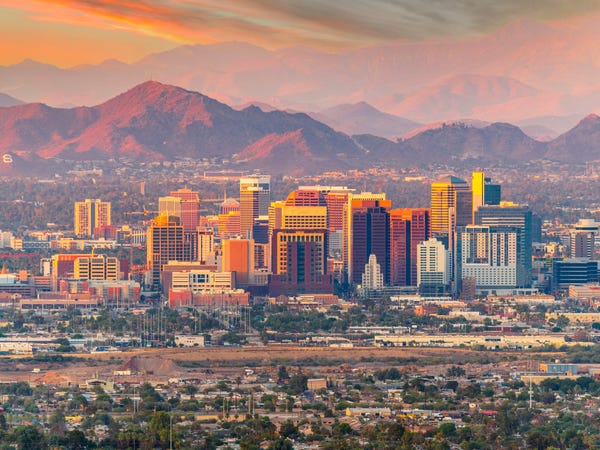Greater Phoenix could become a post-Silicon Valley entrepreneurship hub the world has never seen before according to university officials and business experts.
How so? Through community-based initiatives, use-inspired, practical university research, strong infrastructure, and more resources all leading to accelerated innovation and an improved quality of life.
“Soon, Phoenix may become a byword for innovation,” says Chris Camacho, president and CEO of the Greater Phoenix Economic Council. “The Phoenix business environment has become innovation-focused and start-up supportive. All possible signs are pointing in a positive direction.”
Silicon Valley wasn’t always a $3 trillion neighborhood. Over time, advanced STEM, and tech-based R&D attracted venture capitalists to the San Francisco Bay Area, cultivating a strong business environment.
A similar phenomenon is occurring in Arizona. The number 1 school in the nation for innovation, Arizona State University, a tier-1 research university, has become a premier engine for changemaking initiatives.
And many tech-based companies have made record amounts of investments. For example, Intel announced a $20 billion expansion in Chandler. Taiwan Semiconductor Manufacturing Co. started building a $12 billion advanced fabrication facility. Aerospace and defense company Raytheon Technologies continues to thrive. And most recently, Virgin Galactic announced their next-generation spacecraft will be built in Mesa, bringing thousands of high-skilled jobs to the Valley.
Moreover, tech startups are becoming more prevalent in the Valley. In a report by Gregslist, a free resource for local software companies to communicate and connect leadership talent, job seekers and investors in the tech industry, Phoenix has 813 software companies, 285 of which are startups and 102 are venture capital funded.
But Camacho and Ji Mi Choi, vice president for the ASU Knowledge Enterprise and founding director of the J. Orin Edson Entrepreneurship + Innovation Institute, doesn’t believe a comparison to Silicon Valley provides an accurate depiction of the Arizona market.


According to Choi and Camacho, community separates us from all other cities. Arizonans are fully embracing the steps necessary to compete in the 21st century economy.
“We don’t need to aspire to become Silicon Valley; we want to be our own identity,” Camacho said. “We can go well beyond that. We want to be the most generous entrepreneurial community. There is more of an approach to help one another. We want to see companies hit billion-dollar valuations. We think we can do that by being generous with our time and resources. No matter where you come from, your pedigree, if you have a great, disruptive idea you will get attention.”
Choi agrees.
“How do we inspire entrepreneurial spirit? Through our culture. Arizonans possess a willingness to try new things – take on new challenges,” she said. “ASU’s entrepreneurial mission is rooted in our charter. We measure our success based on who we include, not who we exclude, and we take fundamental responsibility for the community around us. We are taking every step possible to support the next generation of changemakers.”
According to experts, networks can be insulating and used as a form of power or leverage tool. But in Arizona, Choi says our networks are scalable.
“There is a history of entrepreneurs being only for a certain group of people. It is our goal to educate students – to be a knowledge institution and then help entrepreneurs deploy that knowledge in an effective and efficient manner,” Choi said.
The business community avoids insularity and companies aren’t interested in working in a bubble economy.
Experts say our businesses firmly believe in mentorship. Prominent organizations like GPEC give start-ups a chance to connect with industry partners to deploy solutions.
“While innovators are the driving force behind our rapidly growing economy, we have many regional nonprofits and academic institutions that are incredibly supportive. GPEC’s goal is for the market to be a leading force for inducing innovation,” Camacho said. “Entrepreneurial nonprofits are creating a culture between students, innovators, and corporate enterprises. Our universities and community colleges are feeders for talent. And we help entrepreneurs reach their dream, reach their next venture. It’s an intentional culture shift we must take to develop new technologies that don’t yet exist and help companies reach their full potential.”
According to Choi, the emerging startup culture is why we are seeing more venture capital, more opportunities, more accessible resources and a stronger infrastructure that includes people, innovative organizations, and top-tier universities.
More than 155,000 students attend ASU, where research expenditures are making profound impacts across Arizona and the country.
“How do you move from problem to solution? Our research expenditures matter in the entrepreneurial community because we can go from fundamental research to use-inspired, practical applications,” Choi said.
The Silicon Desert could gain an advantage over Silicon Valley because of greater cooperation between municipalities.
“We are taking a multifaceted approach in Arizona. Each community participates and fulfills a role in the regional economy,” Camacho said. “With the growing population base, we are continuously evaluating and implementing strategies for additional housing stock in Arizona. We have made significant progress in addressing our needs around water conservation and augmentation, and we continue to ensure that we have sufficient, reliable energy. All these aspects are vital for business growth.”
Experts agree that a system-based approach to entrepreneurship will allow greater Phoenix to become a one-of-a-kind economic giant.
“We are looking long-term. We need to create a regenerative, cyclical business community with ways to restore itself,” Choi said. “Arizona needs more affordable housing, more housing supply, constantly improving education, more investments. We want industries to be self-serving, so as we look to the future, we need ASU and the state Legislature to continue to collaborate to look at the multifaceted challenges of community development.”
















Add comment